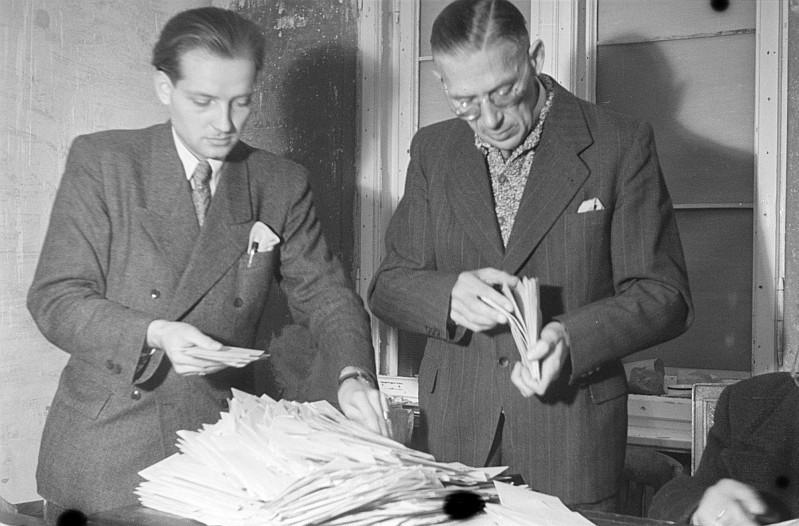Partager Twitter Facebook Email Copy URL
An overview of the coming year in German politics – en anglais !

At first glance, 2021 is set to be just another “super election year” in Germany, with a federal election and six state elections planned, plus local elections in Hesse and Lower Saxony.[1] Unlike previous “super election years”, however, this year’s elections will be overshadowed by the COVID-19 pandemic.
The spread of the new coronavirus and the policy measures that have been introduced with the aim of combatting it have, within a very short space of time, fundamentally altered the daily lives of people all around the world. Bringing the spread of the virus under control, keeping the health system functional and the number of “COVID deaths” low, will continue to require tough changes in daily routines until the spring. The distribution of that scarce commodity, the vaccine, has led to new debates on who can be vaccinated when and why—and whether a vaccination certificate can or should be introduced as a prerequisite for access to and use of facilities of any kind. Having said that, the sheer presence of a vaccine is a light at the end of a dark tunnel.
A sustained easing of the situation on the “COVID front” cannot be expected, at the earliest, until the turn of the year 2021–22. The economic, social, socio-psychological, and political consequences for private households, among children and young people, for everyday habits and public institutions, for state budgets and private companies will be felt by individuals and society as a whole for many years to come. Those consequences will be intermingled with the socio-economic upheavals that are being accelerated under the terms “digitalization” and “decarbonization”. Looking back at Germany’s policies during the crisis to date, it requires no special talent for clairvoyance to see that the fear of the virus and the broad-based suffering that government measures have caused are going to determine the themes of the election campaign—even while the parties still have to figure out pandemic-appropriate campaigning strategies.
Policy responses to the pandemic in Germany have intensified two of the faultlines that run through people’s everyday consciousness. On the one hand, there are disagreements regarding state financial and social support during this time, while on the other there is the question of who should be responsible for the debts these policies will incur. Additionally, there are disputes regarding the “correct” long-term pandemic policy strategy. The fact that we are dealing with a new virus—still in many ways unknown to us—raises the key question as to how to deal with future epidemics, emergencies, and unknown events. Is this a one-off, with no chance of a repeat over the coming decades, or do systemic changes have to be made, and if so, what should they be?
For months, pandemic policy has been reliant on massive voluntary or imposed restrictions of individual social contacts to a “necessary” or “indispensable” level, enforcing a hierarchical order of free-time, consumption-time, and work-time. Many have respected the appeals for sensibility and responsibility towards other people—particularly those who find themselves in sufficiently comfortable social and psychological situations.
However, government recourse to control over individual behaviour has exacerbated old and new forms of inequality and fostered incomprehension, bitterness, and anger. Those who have savings are more likely to be able to withstand the loss of income. People see the pandemic differently from their home office than from the crowded S-Bahn train on the way to the factory or construction site. Those who live alone are more likely to suffer the consequences of social isolation. Risk groups include not only those who are old or who have pre-existing conditions, but also those for whom a healthier lifestyle, which would strengthen the immune system, is financially impossible owing either to the level at which welfare has been set or the constraints imposed by a low income.
The question arises as to the balance between individual responsibility for one’s own behaviour and the systemic, structural preconditions for pandemic-compatible behaviour. This is not only about protective clothing, testing capacities, hospital staff and beds, about how well-equipped schools are, keeping day-care centres open so that parents can continue going to work, or how to keep public transport safe. It is more broadly about safeguarding social institutions so that they are able to cope with unforeseen circumstances. How much “back-up” is generally needed in offices, care facilities, public institutions, i.e. material and personnel that is available but should not be used unless it is wholly necessary? How can democratic rights be exercised and how can democratic structures be maintained during a pandemic?
On the one end of the spectrum, we ask what society can do and how it can prepare good pandemic policy for the future; on the other end we are confronted with questions regarding the extent of individual responsibility, as well as the repressive treatment of members of problem groups such as “large families”, “Baptists” and other religious groups, party addicts, residents of large housing estates, the “uneducated”, esoterics, anti-vaxxers, etc. And in between are those in culture and gastronomy who have “done everything right”, having developed and invested in hygiene concepts that have been proven to work, but are now again the first to have to close.
Of course, there will be other issues present in the election campaign beside the pandemic, and some may even shape it, such as climate, pensions, the labour market, etc. However, expected or unexpected references to the pandemic will inevitably permeate these topics: how seriously are scientists’ warnings being taken? How will the burden be distributed? How many financial, material and human resources should flow into public goods and institutions that are both prerequisites for work and productivity, as well as precautions against risks that will hopefully never eventuate? The pandemic has shown what interventions in private and economic life and what financial resources politicians and the state are capable of and willing to mobilize at short notice—leaving us with the question of why this cannot be done in the case of other emergencies with which we are familiar.
The party system is not very well prepared for situations such as this one. In fact it is ruled by other concerns. Some parties took the “second wave” warnings of virologists and epidemiologists so seriously that they rescheduled key party conferences to precisely this time. Voices from the left and the right have accused the chancellor and the minister-presidents of “backroom dealing”, there have been calls for parliamentary participation and a “long-term strategy”—but what any party would actually do differently remains vague, apart from better, larger spending measures for the benefit of their preferred interest groups. Another characteristic of the current political mood is that the various actions undertaken by individual states were and are perceived as being determined more by electoral targets than by pandemic policy. A striking case is the wrangling between Minister-Presidents Markus Söder (Bavaria) and Armin Laschet (North Rhein-Westphalia) with regard to the chancellorship candidacy. At the same time, the growing public distrust of federal structures harbours the desire for clear direction instead of constant democratic deliberation and negotiation, which the parties and civil society have been doing little to change.
The stability of the party system as it appears in the polls, which have been frozen for over nine months, is only apparent. The polls show that the people’s satisfaction with the democratic system and the work of the federal government increased with the advent of the pandemic. However, only the CDU and CSU benefited from this, returning to their former strength of up to 40% of the predicted electoral vote. Whether this high level of support will continue is highly uncertain for two reasons.
Firstly, it is based primarily on the political skill of Chancellor Angela Merkel, who, however, is not standing for re-election to the Bundestag. The Christian Democrats and their Bavarian sister party, the Christian Social Union (CDU/CSU) is going into the elections without the bonus that usually accrues to the incumbent, and without a candidate who has the confidence of the electorate owing to their track record in government. Secondly, it has been clear since last spring that without Merkel, the CDU/CSU is leaderless and directionless. The upcoming party leadership contest threatens to intensify rather than calm struggles over the direction of travel. The planned orderly transfer of power from Merkel to Kramp-Karrenbauer failed when the opposing candidate, Friedrich Merz, was only narrowly defeated. As an open struggle over power it broke out again in Thuringia, when the CDU and Alternative für Deutschland (AfD) jointly elected a candidate from a five-percent party as minister-president. Since then, it has been increasingly difficult for the federal CDU to maintain the impression that it is adhering to the strategic framework that was presumed to orient the tripolar party system.
In this system, an anti-democratic pole (AfD) is opposed by the remaining pro-democratic bloc, which itself possesses both a right-wing and a left-wing pole, each of which, however, is committed to the Constitution. The CDU, in the end, did not follow through when they had the chance at forming a majority with the AfD against the centre-left state government in Thuringia, consisting of Die Linke, the Social Democrats (SPD), and the Greens. The CDU in Saxony-Anhalt, however, joined with the AfD in rejecting a (far below inflation) funding increase for public broadcasting services. In this context, both the then-state chairperson and the state party’s general secretary combined criticism of the financing with criticism of the content of the broadcasts—an unconstitutional line of thought, but one that is suited to the AfD. Friedrich Merz, now again a candidate for chair of the CDU, expressed his “understanding” for the actions his friends in Saxony-Anhalt took.
The decision on the CDU party leadership will have far-reaching consequences on the future course of the CDU. Armin Laschet stands for a continuation of the pragmatic modernization of social policy and for a cautious transformation of German climate policy that does not endanger the Union’s ability to win a majority. Friedrich Merz, BlackRock’s errand boy, personifies the disconcerting survival of neoliberal ideology, understands modernization primarily as free market adjustment, and represents reactionary, socially conservative positions. He would certainly be able to win back national-conservative voters from the AfD, while at the same time scoring points with voters who want as much of the “old normal” as is possible to return to “after the pandemic”. He has not taken up the call from Wolfgang Schäuble, an elder statesman of the Union, to use the COVID crisis as an opportunity to do a U-turn on economic and EU policy. Instead, Laschet and Norbert Röttgen, the third candidate, are each pursuing this in their own way.
In an interview at the end of April, and in a policy paper at the end of June which marked the beginning of the German EU Council Presidency, Schäuble had described the COVID crisis as a good opportunity to accelerate the restructuring of the German export economy in the direction of “sustainable” technology and to correct the course of European policy, which he himself had led during the Eurozone crisis, by steering the EU in the direction of a transfer union.
The CDU leadership election will, therefore, induce shifts in the party-political landscape. If Merz were to win, a coalition with the FDP based on conservative, national-liberal values could be on the cards, which, if it does not reach a majority, would give new momentum to a political opening towards the (Meuthen-)AfD. The Free Democrats (FDP) are also trying to fish in national-liberal and right-libertarian waters. If Laschet were to win, a coalition of the old conservative propertied bourgeoisie with the new socially-aware, highly-educated middle class—as one could describe the cooperation between the CDU and the Greens—could become a prospect. Just as Merz struggled to excite the “modern” Union voters, it is equally true for Laschet (and Röttgen) that they have hardly resonated among conservative voters. If the CDU/CSU really wanted to make full use of its potential in the Bundestag elections, as per the current polls, then everything would point to the Bavarian CSU Minister-President Markus Söder, who has so far been able to navigate both ends of the spectrum, as the candidate most likely to unite the party.
A government without the Union is currently inconceivable. The parties to its left are unlikely to win more than 40% of the vote. There is no coordinated strategy to win the missing votes. The votes could be won either among production workers with lower or medium qualifications, or correspondingly placed workers in the services sector, up to 50% of which did not vote in 2017 at all. Neither the SPD nor Die Linke has a consistent strategy for mobilizing these groups. Instead, the electoral strategy of Die Linke relies mostly on winning over possible disappointed voters from the SPD and the Greens, while the SPD hopes to gain ground with left-wing voters through a left turn in welfare policy.
One possible alternative is that the votes needed for a majority without the Union be found within the Union’s own voter base. Only the Greens have any significant prospects here. They are most likely to attract CDU supporters who do not want to follow a course set out by Merz—similarly to those CSU supporters in Bavaria who have changed their vote in order to counteract the rise of the AfD and thereby helped the Greens to gain substantial ground. The decisive factors impelling voters to change their allegiances have been and will be normative and practical models of democratic culture and social diversity in contrast to homogenous and authoritarian images of society, as well as concerns for the natural presuppositions of their children’s future. “Soft sustainability” when it comes to economic and social issues would be the driver for CDU/CSU–Green cooperation—not questions of equality and justice in the context of a welfare state.
The SPD settled on Olaf Scholz as its candidate for chancellor at an early stage. The party has so far successfully avoided a renewal of the inner-party polarization in the form of the “get out of the Grand Coalition at all costs” and “being in opposition is pointless” camps. Scholz’s nomination did stop a freefall in the polls, but on the other hand it did not lead to a rise. The efforts within government of those SPD ministers who were able to realize a number of social democratic projects is not paying off in the polls. One reason for this is that the SPD is not sufficiently focused on issues that concern the future and is far too focused on rolling back Gerhard Schröder’s 2010 Agenda. A communication strategy that basically says “Look, we’re doing things differently now”, is firstly a reminder of the policy that drove so many former voters away, and secondly it offends all those who have remained loyal to the party despite or because of this policy. In addition, the party’s main social base of blue- and white-collar workers with basic and medium-level professional qualifications has shrunk.
Olaf Scholz’s only chance to make the SPD stronger than the Greens lies in Angela Merkel’s renunciation of her chancellorship. As finance minister, governing mayor of Hamburg and former labour minister, an orphaned incumbency bonus would fall into his lap. Things might get exciting if Scholz promised to finance the cancellation of Germany’s Schuldenbremse (“debt brake” introduced by constitutional amendment in 2009) and the current national debt not from the currently planned revenue streams, but by shifting the burden towards the upper third of the income and wealth pyramid. This could actually become an outline for a new social alliance in which sections of the upper middle class come together with large parts of the half of society on lower incomes, in order—not least as a lesson learned from the pandemic and its political response—to sustainably rehabilitate and expand public infrastructure and collective goods as the foundations of everyday life.
However, hopes for such an orientation towards a “sustainable welfare state” seem premature in view of the internal state of both the SPD and Die Linke, which would have to share the role of party-political protagonists. While ultimately the SPD will primarily be concerned to not end up behind the Greens and thus finally forfeit its status as the second largest party and leading force in the self-proclaimed “progressive camp”, Die Linke will first have to concentrate on retaining its voter base. Die Linke is suffering as a result of the pandemic because it has been unable to clarify its leadership and directional issues in time for the election campaign. And so it has not been possible—in terms either of the personnel or of the content of political communication—to establish and project a consistent strategy towards “left-wing government”. An agreement between the SPD and Die Linke on a joint political offer to the Greens, which would be more attractive to them than one from the CDU/CSU, is also nowhere in sight. During the pandemic, left-wing social and political forces did not develop their own convincing, independent answer to the question of how another hard lockdown could have been prevented, or what a left-wing critique of the measures put into effect might have looked like—one that would take account of the bind in which governments found themselves, while at the same time taking the fears, insecurities, doubts, and existential worries of citizens seriously and respecting basic rights.
Despite all the uncertainty about how the party system will be shaken up by the Union’s decisions and how the ongoing pandemic will feed back into the election campaign, one thing is for sure: the fight against the pandemic has made apparent something that has been emerging since the banking and financial crisis of 2008: the “return of the state” to the economy, and the relative autonomy of politics. There are more important things than turning a (private) profit every day. Value creation is not a private endeavour, but the collective achievement of a society based on the division of labour. Instead of financial capital, the focus is now on labour and its social presuppositions. Healthcare, nursing homes, kindergartens, schools, digital networks, etc. are each in their own way indispensable parts of the process of value creation. If there are possibilities in politics, then there are also alternatives. These can take either democratic or authoritarian form. The elections in 2021 could decide whether the state wants to regulate market processes and economic power, and if so, in which direction. The fundamentals of the current political constellation have created space for answers from the left.
[1] On 14 March the first state elections will be held in Baden-Württemberg and Rheinland-Pfalz and local elections will be held in Hesse. In Thuringia, the governing coalition (formed by Die Linke, SPD and the Greens) and the CDU have agreed that the new state parliament will be elected on 25 April. Election day in Saxony-Anhalt is on 6 June. The decisions on the make-up of the Bundestag and the state parliaments in Mecklenburg-Vorpommern and Berlin will be made on 26 September, and local parliaments in Lower Saxony are due to be re-elected two weeks earlier.
Horst Kahrs works at the Rosa-Luxemburg-Stiftung’s Institute for Critical Social Analysis on the topics of democracy and elections, classes, and social structure. Translation by Hanna Grzeszkiewicz and Marc Hiatt for Gegensatz Translation Collective. The article was first published on rosalux.de.



